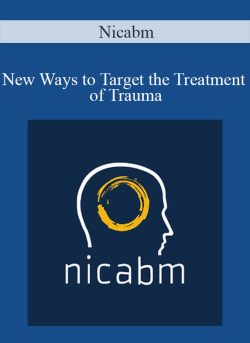Nicabm – Integrating Compassion-Based Approaches into Trauma TreatmentUnlock Healing for Trauma Patients with Compassion-Based TherapyWorking with trauma is some of the toughest work we do, both on us as practitioners and our patients.But compassion-based therapies can enhance your interventions and support your clients through the difficult work of processing trauma.Research suggests that compassion practice can act as a buffer against the harmful effects of trauma. It can help your client develop skills to approach traumatic memories without getting caught up in a threat response during your session.Compassion practices can even equip your clients to repair ruptures following inadequate childhood attachment.So how do we integrate compassion-oriented therapies into treatment and build a client’s capacity to process trauma?We turned to the world’s leading experts in compassion-based therapy and asked them to share their best approaches for working with trauma.Expert Strategies for Integrating Compassion-Based Approaches into Trauma TreatmentHow to Build Your Client’s Capacity for Compassion (and Why That Can Help Them Process Trauma)Deborah Lee, DClinPsy Christopher Willard, PsyD Christopher Germer, PhD Emiliana Simon-Thomas, PhD Susan Pollak, MTS, EdD Kristin Neff, PhDThe Dramatic Impact of Self-Compassion on PTSDWhy Compassion-Based Approaches Are So Effective for Helping Patients Process TraumaWhat to Do When Early Childhood Trauma Has Compromised Your Patient’s Ability to Practice Self-CompassionHow to Help Patients Cultivate Self-Compassion to Repair Attachment RupturesA Powerful Metaphor to Help Patients Open Up to Self-Compassion After TraumaThree Key Steps for Integrating Compassion-Based Approaches into the Treatment of TraumaDennis Tirch, PhD Deborah Lee, DClinPsy Laura Silberstein-Tirch, PsyDCrucial Steps You Must Take Before Applying Compassion-Oriented Approaches to Your Patient’s Traumatic MemoriesHow to Use Compassionate Mind Training to Heal a Traumatized BrainHow to Help Your Patient Bring Compassion to Traumatic MemoriesThe Game-Changing Power of Identifying “Safety Strategies” That Are Harming Your Client’s RelationshipsHow to Integrate Self-Compassion into the Three Stages of Trauma TreatmentChristopher Germer, PhD Susan Pollak, MTS, EdDWhy Compassion Can Be So Effective in Helping Clients Reconnect with the WorldHow Compassion Can Build Your Client’s Internal Resources and Their Capacity for Processing TraumaStrategies to Help Patients When Trauma Creates Blocks to CompassionKristin Neff, PhD Christopher Germer, PhD Laura Silberstein-Tirch, PsyD Jack Kornfield, PhD Christopher Willard, PsyD Dennis Tirch, PhDHow to Use Your Patient’s Blocks and Fears to Build Compassion-Based SkillsTwo Key Phrases for Working with “Backdraft” in Self-CompassionHow Compassion Can Cultivate Courage and Accelerate Post-Traumatic GrowthHow to Use Compassion as Motivation for TransformationCritical Insights: Integrating Compassion into the Treatment of TraumaKelly McGonigal, PhD Ron Siegel, PsyD Ruth Buczynski, PhDThe Role Oxytocin Can Play When Integrating Compassion into Trauma WorkWhy Some Patients Experience a “Vulnerability Hangover” After Compassion Practice – and How to Mitigate ItThe Key Factor That Can Make Self-Compassion Sustainable for Patients Who Have Experienced TraumaCompassion-Based Practices to Help Patients Feel Safe and AcceptedSpecific De-Shaming Language to Normalize a Client’s Response to TraumaConcrete Compassion-Based Strategies for Addressing Trauma (and How to Integrate Them into Your Work)Rick Hanson, PhD Deborah Lee, DClinPsy Ashley Vigil-Otero, PhDSelf-Compassion Skills Patients Can Use to Create a Sense of SafetyPractical Exercises That Can Bring Compassion to Your Patient’s Trauma StoryTwo Specific Ways to Use Psychoeducation to Help Patients Process Traumatic MemoriesHow to Apply Compassionate Imagery to Help Patients Create an Internal Support SystemThree Key Compassion-Based Ways to Help Patients Expand Their Window of ToleranceHere’s What You’ll Get:Everything is yours to keep forever in your professional library Downloadable videos so you can watch at your convenience, on any device Audio recordings you can download and listen to at home, in the car, at the gym or wherever you like TalkBack Segments to distill key ideas (this is where we “land” the session) Next Week in Your Practice sessions to give you concrete strategies to use with patients Professionally-formatted transcripts of the sessions, to make review and action simple Four downloadable bonus videos to help you apply compassion more effectively to trauma therapySale Page: https://www.nicabm.com/program/trauma-compassion/?del=store Archive: https://archive.fo/QICWXDelivery Method– After your purchase, you’ll see a View your orders link which goes to the Downloads page. Here, you can download all the files associated with your order.– Downloads are available once your payment is confirmed, we’ll also send you a download notification email separate from any transaction notification emails you receive from Forimc.me.– Since it is a digital copy, our suggestion is to download and save it to your hard drive. In case the link is broken for any reason, please contact us and we will resend the new download link.– If you cannot find the download link, please don’t worry about that. We will update and notify you as soon as possible at 8:00 AM – 8:00 PM (UTC+8).Thank You For Shopping With Us! Reviews There are no reviews yet.Be the first to review “Nicabm – Integrating Compassion-Based Approaches into Trauma Treatment” Cancel replyYour rating *Rate…PerfectGoodAverageNot that badVery poorYour review *Name *Email *Δ
 Nicabm – The Body’s Critical Role in the Treatment of Trauma
₹8,134.00
Nicabm – The Body’s Critical Role in the Treatment of Trauma
₹8,134.00
 Nicabm – New Ways to Target the Treatment of Trauma
₹8,134.00
Nicabm – New Ways to Target the Treatment of Trauma
₹8,134.00
Nicabm – Integrating Compassion-Based Approaches into Trauma Treatment
₹8,134.00






